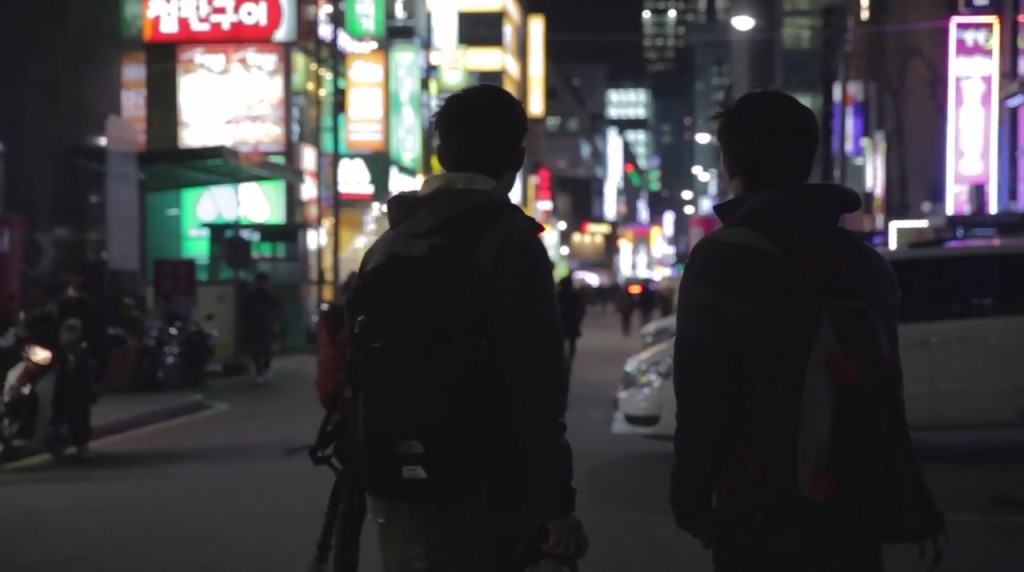- California Assembly OKs highest minimum wage in nation
- S. Korea unveils first graphic cigarette warnings
- US joins with South Korea, Japan in bid to deter North Korea
- LPGA golfer Chun In-gee finally back in action
- S. Korea won’t be top seed in final World Cup qualification round
- US men’s soccer misses 2nd straight Olympics
- US back on track in qualifying with 4-0 win over Guatemala
- High-intensity workout injuries spawn cottage industry
- CDC expands range of Zika mosquitoes into parts of Northeast
- Who knew? ‘The Walking Dead’ is helping families connect
Jubilee Project’s ‘Save My Seoul’ looks into the Korean sex trade industry
By Tae Hong
Two Korean American brothers traveled to Seoul and threw themselves into its prostitution and sex trafficking scene with hidden cameras and undercover access. They were baffled.
The Jubilee Project’s Jason Y. Lee and Eddie Lee are now ready to share — and educate the world — with what they saw and heard.
“Save My Seoul,” a new feature-length documentary and the biggest ever by the Jubilee Project, provides an unfiltered window into the reality of the sex trade industry that runs rampant inside Seoul, one of the world’s most cosmopolitan cities.
Footage taken from hidden cameras and undercover access to prostitutes and pimps shows a Seoul set apart from the flashy, clean frames of the city typically seen through Korean popular culture.
The Jubilee Project is a non-profit organization that was founded by the brothers in 2012. More than 120 videos can be found on its YouTube channel, where awareness projects dealing with issues such as anti-bullying and autism have garnered more than a combined 11 million views.
Work on the documentary, which started in May 2013, was an eye-opening experience for the brothers, who had had no idea what they were getting themselves into and who took up the issue after a similarly eye-opening trip through Southeast Asia.
“I believe [human trafficking] is the largest injustice of our time,” Lee said. “When you see that firsthand and meet some of the victims, it’s impossible not to do something.”
Jason Y. Lee, who acted as director, said the brothers were almost caught with the cameras several times.
“We felt it was imperative to capture the truth and show what was really happening inside these red light districts and brothels,” he said.
According to Lee, Korea sees about 94 million cases of prostitution each year, a $13 billion industry that still sees itself being ignored by most Koreans, who “are more concerned with putting on a good face and hiding it.”
Until its official release in spring 2015, Jubilee Project plans to promote “Save My Seoul” through screenings at schools, churches and organizations. Screenings will begin on Oct. 15.
“I think this problem exists because the culture is broken and that’s because each of us are broken,” Lee said. “I hope this film makes us all think about and realize that this is wrong — we need to reevaluate the way that we see these girls and the value we put to human life.”
View the trailer below:

















jay huh
September 18, 2014 at 4:35 AM
get a life.
Matthias Lehmann
September 19, 2014 at 5:41 AM
Beware of do-gooders.
‘Facts’ Jason and Eddie present on their website and in the trailer include:
“Between 500,000 to 1.2 million girls working in sex trade in South Korea” Source: Korean Feminist Association/Link
Apart from the fact that this figure is not even a guesstimate, ranging from 500,000 to more than twice that, the figure was first spread more than ten years ago and before the adoption of South Korea’s Anti-Sex Trade Laws.
“An estimated 200,000 youths run away from home each year in Korea and
many fall into the sex trade.” Source: Korean Municipal Government/Link to Al Jazeera article
Al Jazeera deemed it necessary to add a note to the linked article that “these NGO figures are not supported by any official data and are impossible to verify”.
“There are about 1,200 businesses involved in sex trafficking.” Source: None
Actual facts are:
“Police crackdowns from 2004-2009 resulted in arrest of approximately 28,000 sex workers.”
Due to the conflation of sex work and trafficking “[m]igrant sex workers often live with the constant threat of being reported, arrested and deported which creates a real barrier to accessing health and welfare services. Female migrant sex workers are frequently assumed to be trafficked when ‘moral panics’ around migration and sex work are created for populist political gain.”
Source: United Nations Development Project “Sex Work and the Law in Asia and the Pacific” http://asia-pacific.undp.org/content/rbap/en/home/library/hiv_aids/sex-work-and-the-law-in-asia-and-the-pacific/
Matthias Lehmann
September 25, 2014 at 1:46 AM
“The last thing sex workers or any people in exploitative labour situations need are voyeurs or do-gooders grandstanding as saviours. Not without reason do sex workers frequently declare: save us from saviours!”
Save My Seoul? Save Us From Saviours!
http://wp.me/p294H2-13H
Pingback: The Slut-Shame Game: Fueling the Flames of South Korea’s Sex Industry | seoulbeats